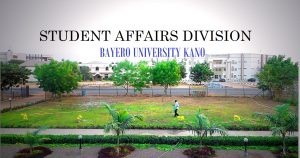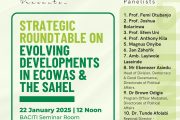
The author
By Prof Ikhide Imumorin
Science Communication Hub Nigeria, (www.scicomnigeria.org), which originally published this piece under the title “The Nigerian University System: Matters Arising Part 1” introduced the author as “Founder and CEO, African Biosciences Ltd, Ibadan, Nigeria, a new life science company supporting molecular and biotech research and Adjunct Professor, School of Biological Sciences, Georgia Institute of Technology, Atlanta, GA. USA. He writes from Atlanta, USA”. Georgia Institute of Technology is not a Caltech but neither is it a pushover in stature. In this piece, the author is savaging almost everyone in the Nigerian university system.
An outdated method of assessment of academics
There are many problems in the Nigerian university system. However, the most worrying which I believe is long outdated is the method for evaluation of academics in Nigerian universities. One of the main ways of promoting academics is through publications. In this method, the first author of a research paper usually gets a higher point, followed by the co-authors in the list. This method is outdated and does not represent the true contribution of authors of the research. In fact, in some scientific disciplines (e.g. Life sciences), the first author is not necessarily the most important author. Nowadays, good journals ask for individual author contributions which thus makes it way easier to assess every person’s contribution instead of looking at the author arrangement on a paper. Therefore, I would say it is crucial for universities to tackle the issue of assessing publications using modern criteria instead of the current one from the Dark Ages. They should have assessments that put emphasis on impact factor, quality of contribution, the scope of research and recognition by peers instead of the broken and patronising system we have now that just celebrates mediocrity and substandard work.
Assessment of scientific publications
 Another major problem has to do with the ranking of scientific journals for academic promotions in Nigeria. Some research papers might take months or even years to get published due to rigorous peer review in good journals. Such articles cannot be compared with some journals published in unrecognised local or predatory journals, as is currently the case in Nigerian universities. For example, how could one compare a paper that looks at the “effects of particle size on leg width of ants” published in ‘River Benue International Journal of Research’ with an article published in Nature or Science?
Another major problem has to do with the ranking of scientific journals for academic promotions in Nigeria. Some research papers might take months or even years to get published due to rigorous peer review in good journals. Such articles cannot be compared with some journals published in unrecognised local or predatory journals, as is currently the case in Nigerian universities. For example, how could one compare a paper that looks at the “effects of particle size on leg width of ants” published in ‘River Benue International Journal of Research’ with an article published in Nature or Science?
Importantly, a paper published in top journals like Science or Nature with 50 authors is not the same with a single author paper. There are papers on genomics these days with 500+ authors. That single paper might have cost millions of dollars. For example, it might have involved the analyses of say 200,000 samples for say 1 million molecular markers and include dozens of research groups in dozens of counties on multiple continents. These papers get published in high impact factor journals like Nature and Science. Of course, we are not saying Nigerian academics must be able to do this particular kind of work, but these types of work should serve as models to aspire to. Importantly, such kinds of research cannot be compared with research published through questionable peer review process or work published in a local journal. Our universities should recognise this difference and promote good academic publishing ethics among academics. They should assess academics differently depending on where they publish!
To encourage scholarship and enhance the level of discoveries and innovation, universities have to establish a reward system to support the publishing of good articles in good journals. For example, the university can encourage publishing in better journals, as well as set some money aside to help with publication charges. Each department could be mandated to come up with a list of 10 to 15 best, better, good and average journals in their field and faculty could be encouraged to publish in those journals. The university could go ahead to incentivise it by giving extra points calibrated to reward getting into better journals instead of Crackpot International Journal of Science with no website, DOI numbers or availability in Google Scholar.
Lack of collaboration
In addition, there is little or no collaboration between scientists, departments and institutions in Nigerian universities, which is important for discoveries and innovation. For example, in Nigerian Universities, researchers from a Department of Zoology cannot use equipment in the Department of Microbiology and vice versa, much less collaborate. Even researchers in the same department hide reagents bought by the department and relocate the only functioning pH meter so that no one can use it in their research to get published and get that promotion before them. How can this aid discoveries and innovation?
For example, in modern biology fields of genetics and genomics, to convincingly identify a new immune gene for instance and show that it is involved in an immune pathway, you may need an immunologist, computational biologist, biochemist, physiologist, a biostatistician and physical chemist. You may be deploying mass spectrometry to identify proteins, generate a knock-out mouse model to test gain of function mutation effect, screen for variants in a large population, determine de-novo sequence structure, conduct genome-wide computational analysis, profile expression in different tissues and you cannot be an expert in all these areas. Doing this kind of work may take 5 to 6 years and end being published in high ranking journals like Nature, Science, Cell or PNAS. How could this be ever accomplished without collaboration?

A recent VC

Another recent VC
Lack of support and good scholarly culture
It is common in the West for departments to hold weekly or biweekly seminars to talk about ongoing research and invite external researchers to present a talk to foster collaborations. This creates an exciting scholarly environment to be intellectually engaged. This is not the case in Nigerian universities. In the vast majority of Nigerian universities, academics have no real idea of what their colleagues are doing by way of research. This scholarship culture has to be addressed to enhance the productivity of Nigerian scholars.
In addition, do Nigerian universities really invest in boosting the skills of their academics? Imagine if you went to a university and there is a Center for Teaching and Learning to help faculty members learn how to teach better, provide pedagogical tools to students, feedback from students and improve faculty teaching skills? This Center will organize regular training workshops to help faculty create truly modern learning spaces and go beyond droning on and on during lectures putting students to sleep or simply giving student notes to photocopy, the same notes they were given as students decades ago.
Is funding always the problem or is it mismanaged?
Every time money was injected into the Nigerian university system it was mostly mismanaged. The World Bank gave $120 million for staff development in the mid-1990s which was when my career began in the system. Today, it is difficult to say how that money was spent. Of course, some academics were trained, but the money could have been used more robustly.
In fairness to the Tertiary Education Trust fund (TETFund) which is currently the main funder of research in Nigeria, it has injected hundreds of billions of naira into Nigerian universities. However, what we have mostly to show are large, fancy, sometimes empty buildings which may also have fancy non-functional equipment. Yet academics aren’t getting trained to do modern research, not taught grant writing skills to access TETFund and other international grants. How many Universities have grant offices? How many provide serious grantsmanship training to faculty members? Therefore, TETFund complained that it has billions of naira as research grant available, but many academics are unable to access it (https://www.icirnigeria.org/90-of-lecturers-research-proposals-very-poor-and-unfundable-says-tetfund/).
Imagine if you went to a university and found that it has a University Grants Office or as we sometimes call it here in the United States, Office of Sponsored Programs headed by a director who has actually written and won grants? And this office operates a strong training program for faculty to learn how to write grants and provides support through advocacy, administrative backstopping and information on grant opportunities through say a quarterly newsletter to all faculty members?
I would say therefore we have to start by acknowledging the main problems in the system and accept that lack of money is not at the top or the most crucial. There is no institution across the globe today that would confidently say they have enough money. Even the universities in the rich West complain of funding cuts. However, because they have addressed internal problems, they are able to work efficiently with the little funds available.
Sloppy Accreditations
Looking at various science departments across Nigerian institutions, one could say that the accreditation exercise for departments is sloppy. How did a Department of Computer Science that lacks a serious computer lab get accreditation? How can a Department of Biotechnology that lacks a serious Biotech lab be accredited to award degrees? There are such departments where even a common pH meter is lacking, talk less of the equipment and reagents to do serious biotechnology experiments that involve DNA or RNA extraction. How did these departments pass accreditation? So, this, instead of money, contributes to the failure of the system and eventually the training of graduates that lack competence in their chosen areas of specialty.

A 3rd generation Nigerian university with traces to a first generation university but is it privileged in the crisis?

Another 3rd generation Nigerian university
Innovation and business ideas
Universities could invest in their students to make innovations that would support their structure. Imagine if a Department of Electrical Engineering and Mechanical Engineering had designed a solar power system implemented by the University to make sure they got some power for a few hours a day instead of operating in near perpetual darkness or each faculty or department struggling to buy diesel for a generator that sometimes even the Head of Department or Dean uses their personal funds to service or buy fuel? I personally know Deans who spend their money buying diesel so that they won’t totally be in the dark in their offices.
Moreover, most Nigerian universities have vast expanses of land that are not used properly. Imagine if a university could enter an agreement that would permit interested parties to use the university’s unused land for farming on a contract basis to enable the university generate revenue that could go towards supporting its services and research. Universities may be able to tap internal resources and external financing to establish commercial farms on campus that would generate them revenues.
Change needs to start from senior management
I may sound harsh but our senior academics or those in the top management bear the most blame. If a department or entire system is dysfunctional you cannot blame the low-level people but the leaders who make and implement policy. More money in and of itself will not solve the sickness of the Nigerian academic system. We need to agree on changing the fundamental rules first. Leaders in the system must be selected on merit and evaluated on performance. At the risk of being misunderstood and offending many, our current academic leaders are under performing like our political leaders, maybe even worse given how well educated they are. Implementing good ideas alone will improve things long before you get any more money into the system.
The Nigerian academic system biggest problem is not lack of enough money. No amount of money will fix this system. What we need are visionaries committed to implementing good ideas. These ideas are not rocket science and not hard to find and many if not most don’t require a lot of money or even money at all. We need transformational leadership at the universities. Do we have Vice-Chancellors, Deputy Vice-Chancellors, Deans, Directors or even Head of Departments who will step up and be counted or are they all mostly just talk and no action?!




























